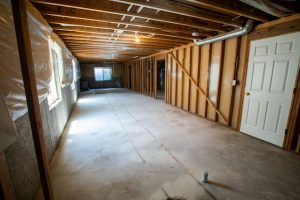Table of Contents
Embarking on a basement conversion in London is a complex yet rewarding endeavor.
It offers homeowners an opportunity to expand their living space in a city where above-ground extensions might not be feasible.
This guide aims to provide a structured approach to planning a basement conversion in London, addressing key elements such as regulatory requirements, design considerations, and practical steps.
With meticulous planning and adherence to local standards, a basement conversion can significantly enhance both the functionality and value of your London home.
Key Aspects of Basement Conversion

Basement conversions in London offer a unique opportunity to expand the usable space of a property in an area where additional building room is often limited.
This process involves several key considerations, including understanding and complying with local planning permissions and building regulations.
These regulations are critical for any significant alterations, especially in properties located in conservation areas or designated as listed buildings.
Moreover, adherence to building regulations is essential to ensure the safety, quality, and structural integrity of the conversion.
Finding a relevant Online Guide for Basement Conversion
Embarking on a basement conversion requires thorough research and planning.
One of the first steps is to find a comprehensive online guide that covers all aspects of the process.
A good guide should provide a detailed overview of the steps involved in planning and executing a basement conversion.
This includes insights into budgeting, navigating planning applications, and the importance of selecting the right construction and design team.
Such a guide should address how various factors like the property’s location, the intended purpose of the basement, and the expertise of the construction team can influence the overall project.
Budget Considerations and Cost Analysis

A critical aspect of planning a basement conversion is budgeting and cost analysis.
The cost is variable, depending significantly on factors like the extent of excavation required, structural alterations, and the specific characteristics of the property’s location.
It’s essential to prepare for a range of expenses, considering not just construction costs but also fees associated with planning permission and building regulation compliance.
A comprehensive budget plan should account for these variables to provide a realistic financial framework for the project.
Designing Your Basement Space
The design phase of a basement conversion is where homeowners can truly personalize their space.
Key design considerations include maximizing the use of natural light, selecting appropriate materials that are moisture-resistant, and ensuring adequate ventilation to maintain a healthy living environment.
The ceiling height, storage solutions, and soundproofing are also important factors, especially in residential areas.
The design should not only reflect the homeowner’s style and needs but also adhere to safety standards, including accessible emergency exits and fire safety measures.
Practical Execution and Project Management

The practical execution of a basement conversion requires meticulous project management.
This includes selecting and coordinating with a team of professionals such as architects, engineers, and contractors.
Managing the timeline and ensuring that each stage of the conversion process, from initial excavation to final finishes, complies with the planned schedule is crucial.
Attention to detail in every step, from damp-proofing and waterproofing to the installation of electrical and plumbing systems, ensures the project’s success.
Understanding the London Housing Market in 2024

The London housing market in 2024 presents a landscape shaped by resilience and gradual recovery.
After experiencing a decline in house prices in the previous year, London’s real estate market is witnessing a rebound in buyer demand in the early part of 2024.
This upswing indicates a potential turn of fortunes for a market that, over the past seven years, has been lagging behind the rest of the UK in terms of sales volumes and house price inflation.
Market Trends and Buyer Demand
The increase in buyer demand in London is evident across various areas, including the inner city, suburban outer regions, and key commuter zones.
This demand is not just confined to the capital but is also mirrored in the East of England. Factors influencing this resurgence include improvements in mortgage lending and a shift in housing affordability.
The market conditions, however, continue to favor buyers, with a significant proportion of sellers needing to accept price reductions to facilitate sales.
House Price Movements and Affordability

Despite the current uptick in demand, London’s housing market remains marked by a notable challenge: affordability.
House prices in London have historically been high compared to earnings, reaching a peak unaffordability level in 2016.
While there is a gradual improvement in affordability, the average property prices continue to be a significant multiple of average earnings.
This scenario suggests that the market’s recovery might bolster housing sales rather than lead to a steep increase in house prices.
Projections For 2024 And Beyond
Looking ahead, the London housing market in 2024 is expected to continue its path of steady improvement.
Factors such as slowly improving affordability, alongside earnings rising faster than house prices, are likely to support this trend.
However, the market remains sensitive to sellers’ pricing strategies and overall economic conditions, indicating that a balanced approach is crucial for both buyers and sellers in this evolving landscape.
Final Remarks
As we look towards the future of London’s housing market and the realm of basement conversions, the landscape is marked by both opportunities and challenges.
For homeowners, a basement conversion in 2024 is not just a renovation project, but a strategic investment in maximizing space and enhancing property value in one of the world’s most dynamic cities.
This endeavor requires balancing the complexities of regulatory compliance, design innovation, and financial planning.
Meanwhile, the broader London housing market is showing signs of resilience and recovery, with an increase in buyer demand and a cautious optimism for gradual affordability improvement.
This underscores the importance of strategic planning and market awareness for both current and prospective homeowners.
As London continues to navigate through evolving market conditions, staying informed and adaptable will be key for those looking to capitalize on the city’s housing opportunities.
Author Profile

- Blogger by Passion | Contributor to many Business Blogs in the United Kingdom | Fascinated to Write Blogs in Business & Startup Niches
Latest entries
 BusinessJune 20, 20244 Benefits of Using a Crypto Wallet for Business
BusinessJune 20, 20244 Benefits of Using a Crypto Wallet for Business BusinessJune 19, 20245 Innovative Ways Cloud Solutions Are Revolutionising London Businesses
BusinessJune 19, 20245 Innovative Ways Cloud Solutions Are Revolutionising London Businesses BusinessJune 5, 2024How the Rise of Casual Gaming in Tech Startups Benefits HR
BusinessJune 5, 2024How the Rise of Casual Gaming in Tech Startups Benefits HR BusinessMay 30, 20248 Office Kitchen Essentials for Businesses
BusinessMay 30, 20248 Office Kitchen Essentials for Businesses




